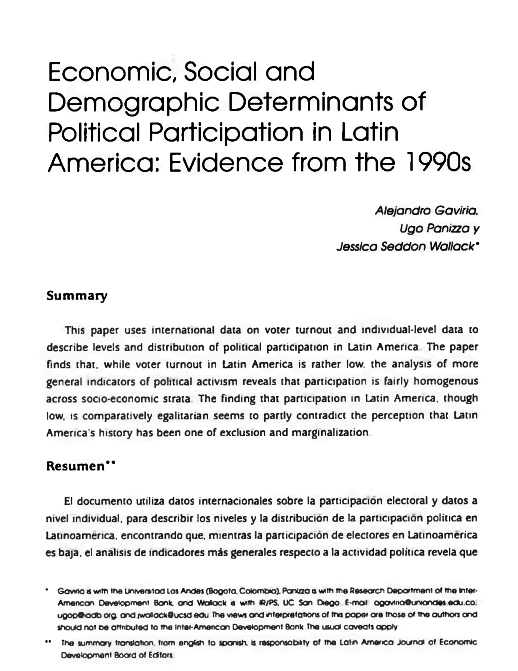Economic, Social and Demographic Determinants of Political Participation in Latin America: Evidence from the 1990s
DOI:
https://doi.org/10.35319/lajed.20043279Keywords:
Political pariticipation, Latin America, Political activismAbstract
This paper uses international data on voter turnout and individual-level data to describe levels and distribution of political participation in Latin America The paper finds that, while voter turnout in Latin America is rather low. the analysis of more general indicators of political activism reveals that participation is fairly homogenous across socio-economic strata The finding that participation in Latin America, though low. is comparatively egalitarian seems to partly contradict the perception that Latin America’s history has been one of exclusion and marginalization.
Downloads
References
Almond, G. and S. Verba. 1963. The Civic Culture Boston. United States: Little, Brown.
Ames, B. 1995. "Electoral Rules, Constituency Pressures, and Pork Barrel: Bases of Voting in the Brazilian Congress" . Journal o f Politics. 57(2): 324-343.
Becker, G. S. 1983. "A Theory of Competition among Pressure Groups for Political Influence". Quarterly Journal o f Economics. 98: 371-400.
Benabou, R. 2000. "Unequal Societies Income Distribution and the Social Contract". American Economic Review. 90: 96-129.
Booth, J. and M. Seligson. 1993. "Political Culture and Regime Type: Evidence from Nicaragua and Costa Rica". Journalo f Politics. 55(3): 777-792.
Booth, J. and M. Seligson. 1993. Political Participation in Latin America, Vol. I: Citizen and State. New York: Holmes and Meier Publishers. 1978.
Corporación Latinobarómetro. 1996, 1997, 1998. Informes metodológicos. Santiago de Chile Corporación Latinobarómetro.
Corporación Latinobarómetro.1996, 1997, 1998. Cuestionarios y planes de codificación. Santiago de Chile: Corporación Latinobarómetro.
Dahl, R. 1971. Polyarchy, Participation, and Opposition. New Haven. United States: Yale University Press.
Dealy, G. 1974. "The Tradition of Monistic Democracy in Latin America". In: H. Wiarda.ed, Politics and Social Change in Latin America: The Distinct Tradition.Amherst. United States: University of Massachusetts Press.
Downs, A. An Economic Theory o f Democracy. Boston. United States: Addison Wesley.
Filmer, D., and L. Pritchett. 2001. "Estimating Wealth Effects without Income or Expenditure Data-or Tears: Education Enrollment in India". Demography. 38 (I).
Filmer, D., and L. Pritchett. 1998. "The Effect of Household Wealth on Educational Attainment around the World: Demographic and Health Survey Evidence" Washington, DC. United States: World Bank. Mimeographed document.
Glass, D., P. Squire and R. Wolfinger. 1984. "Voter Turnout An International Comparison". Public Opinion. 6: 49-55.
Haggard, S. and M. Shugart. 1999. "Institutions and Public Policy in Presidential Systems" San Diego, United States: University of California. San Diego. Manuscript.
Henisz, W. 2000. "The Institutional Environment for Economic Growth" Economics and Politics. 12: 1-31.
IDEA. 1997. Voter Turnout from 1945 to 1997: A Global Report on Political Participation. Stockholm International Institute for Democracy and Electoral Assistance.
Inglehart, Ronald. 1988. "The Renaissance of Political Culture". American Political Science Review: 82 1203-30.
Inglehart, Ronald. 1990 Culture Shift in Advanced Industrial Society. Princeton Princeton. University Press.
Inter-Parliamentary Union. Parline Database. Online Database. http://www.ipu.org/parline-e/parlinesearch.asp
Jackman, R. 1987. " Political Institutions and Voter Turnout in the Industrial Democracies". American Political Science Review. 81: 405-423.
Krueger, A. O. 1974. "The Political Economy of the Rent-Seeking Society" American Economic Review. 64: 291-303.
La Porta, R., F. Lopez-de-Silanes, A. Shleifer and R. Vishny. 1999. "The Quality of Government". Journal of Law. Economics and Organization. 15: 222-279.
Lijphart. A. 1994. Electoral Systems and Party Systems: A Study o f Twenty-Seven Democracies. 1945-1990. Oxford, United Kingdom: Oxford University Press.
Lipset, S. M. 1963. Political Man: The Social Bases o f Politics. New York, United States. Anchor/Doubleday.
Mainwaring, S. and T. Scully. 1995. " Introduction: Party Systems in Latin America". In: S. Mainwaring and T. Scully eds. Building Democratic Institutions Party Systems in Latin America. Stanford. United States: Stanford University Press.
Mainwaring, S. and M. Shugart eds. 1997. Presidentialism and Democracy in Latin America. New York, United States. Cambridge University Press.
Panizza, U. 2001. "Electoral Rules, Political Systems, and Institutional Quality". Economics and Politics. 13: 311- 342.
Portes, A. and J. Itzigsohn. 1997. "The Party or the Grassroots: A Comparative Analysis of Urban Political Participation in the Caribbean Basin" In: W.C. Smith and R. P. Korzeniewicz eds. Politics. Social Change, and Economic Restructuring in Latin America. Miami, United States: North-South Center.
Powell. G. B. 1986. "American Voter Turnout in Comparative Perspective" American Political Science Review 80(1): 17-37.
Rodriguez, F. 1998. "Inequality, Redistribution, and Rent-Seeking". College Park. Maryland, United States: University of Maryland. Mimeographed document.
Stokes, S. 1995. Cultures in Conflict: Social Movements and the State in Peru. Berkeley, United States and London, United Kingdom: University of California Press.
Summers, R. and A. Heston. 1991. "The Penn World Table (Mark 5): An Expanded Set of International Comparisons, 1950--1988". Quarterly Journal o f Economics.106(2): 327-68.
Taagepera, R. and M. Shugart. 1989. Searsand Votes: The Effects and Determinants of Electoral Systems. New Haven, United States and London, United Kingdom: Yale University Press.
Taylor, C. L. and M. Hudson. 1972. World Handbook of Political and Social Indicators. New Haven, United States: Yale University.
Thorpe, R. 1998. Progress, Poverty and Exclusion: An Economic History o f Latin Americain the 20th Century. Washington, DC. United States: Inter-American Development Bank.
UNDP. 1996. Human Development Report. New York, United States: Oxford University Press/United Nations Development Programme.
Verba, S. 1996. "The Citizen as Respondent: Sample Surveys and American Democracy". American Political Science Review. 90: 1-7.
Weingast, B., K. Shepsle and C. Johnson. 1981. "The Political Economy of Benefits and Costs A Neoclassical Approach to Distributive Politics". Journal o f PoliticalEconomy. 89(4): 642-664.
Wolsfeld, G., K-D. Opp, H. A. Dietz et al. 1994. "Dimensions of Political Action A Cross-Cultural Analysis". Social Science Quarterly. 75(1): 98-114.
World Bank. 1998. The State in a Changing World. New York, United States: Oxford University Press/World Bank.






